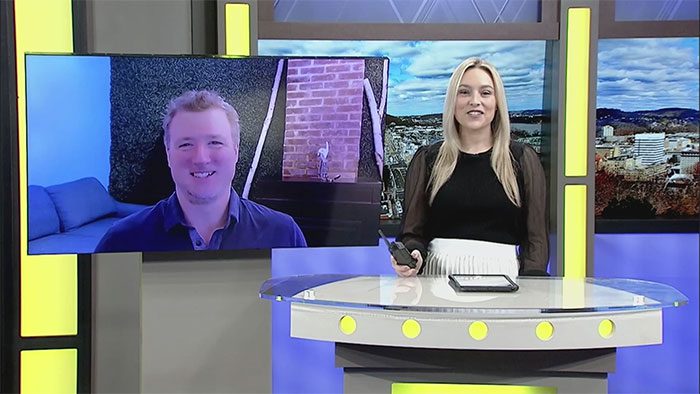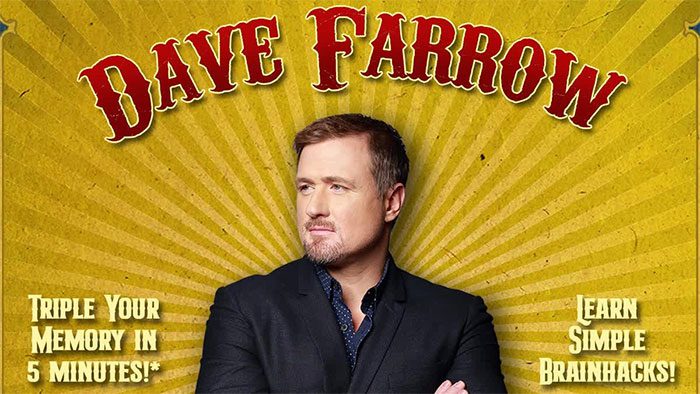In 2007, Dave Farrow re-established the memory record. Farrow successfully memorized 59 decks of cards, totaling 3,068 shuffled cards. To this day, no one has surpassed his record.
Dave Farrow is a two-time Guinness World Record holder for the greatest memory. In 1996, at the age of 21, Farrow set the world record after memorizing the position of each card in 52 decks (2,704 cards) that had been shuffled. He was allowed to see their order only once.
By 2002, another memory coach from the UK, Dominic O’Brien, broke Farrow’s record by memorizing 54 decks of cards.
However, in 2007, Dave Farrow reclaimed the record. This time, he successfully memorized 59 decks, or 3,068 shuffled cards.
And to this day, no one has surpassed his record.

Dave Farrow is a two-time Guinness World Record holder for memory. (Photo: CNBC).
Currently, Dave Farrow is the CEO of Farrow Memory and Farrow Communications. He has been a featured guest in over 2,000 media interviews, including shows such as The Today Show, Live with Regis and Kelly, Steve Harvey, Discovery Channel, and more.
To achieve his world record, Farrow used the “Farrow Memory Method”. This method was initially invented to combat his dyslexia and ADHD (Attention Deficit Hyperactivity Disorder). To date, it is a unique memory system supported by scientific research (with a control group) at McGill University.
In a book titled “The Brain Hacker: Mastering Memory, Focus, Emotions, and Unlocking Your Inner Genius,” Farrow has distilled many ancient memory techniques, examining them through the lens of modern neuroscience and using his personal experiences to create what he calls the “Farrow Memory Method.”

Dave Farrow has been featured in over 2,000 media interviews.
Sharing on CNBC Make It, “The Brain Hacker” Farrow stated, “For memory and mental focus in general, the key is novelty. The more novel something is, the more you will remember it. But also, an activity that is very novel, unique, or different is something that challenges your brain more.”
Below are the ways that the two-time world record holder has enhanced his memory and concentration.
1. Have short periods of intense focus followed by rest periods
“We have powerful brains, and it also has a terrible battery life. It’s important to activate focus on demand, not to try to force your brain to focus for 24 hours. If you are trying to memorize something or focus on an activity, you should concentrate intensely for 6-8 minutes and then clear your mind completely by meditating or doing some stretching exercises for a short time,” Farrow advises.
“This is really one of the secrets behind my Guinness record. I would never have been able to memorize 59 shuffled decks if I tried to memorize them all at once,” he adds.

It’s important to activate focus on demand, not to try to force your brain to focus for 24 hours. (Photo: Getty).
2. Engage in conversations with new people
“Meeting new people and engaging in interesting conversations is a way to stimulate the brain. It can also be great for enhancing memory,” Farrow explains.
“You need to be social. Get out and meet new people. For those with Alzheimer’s or dementia, or who are at risk for it, the best thing they can do is to be social,” he adds.
3. Participate in challenging activities
According to Dave Farrow, don’t hesitate to try something new even if you think you won’t be good at it. For example, playing a new instrument can be a challenge, but even if you don’t know how to play, it’s still beneficial for stimulating the brain.
“Additionally, consider learning a new language, starting a garden, or even changing your car’s oil if you’ve never done it before,” he notes.

To achieve the world record, Farrow used the “Farrow Memory Method.” (Photo: FFW).
4. Look up information as often as possible
According to Farrow, this is actually a quirky trick that helps boost memory. “When you look up something, it’s the brain’s natural tendency to try to recall something. No one knows why, but we know that it sends more energy to the cortex and hippocampus – the brain’s memory centers.”
“So, by looking up information as often as possible, you will actually improve your memory,” Farrow states.
5. Practice deep breathing exercises
Farrow suggests that you should regularly breathe deeply by expanding your stomach when inhaling and contracting it when exhaling. “You will find that your brain changes and relaxes,” he explains. This will be very helpful if you cannot concentrate or remember certain information because you are extremely stressed.
“With the students I’ve worked with, when they are stressed, deep breathing often helps them recall information,” Farrow shares.
Reflecting on his memory techniques, Farrow said: When I was a child, I was diagnosed with ADHD and dyslexia. At that time, knowledge about these conditions was limited, and people viewed them as disadvantages, and I initially thought so too.
When I first broke the Guinness record, no one believed I could do it. When I reclaimed the record for the second time, they all said, “Oh, why didn’t you do this sooner?”
I just want to show those with ADHD or dyslexia that they can achieve some remarkable things.





















































